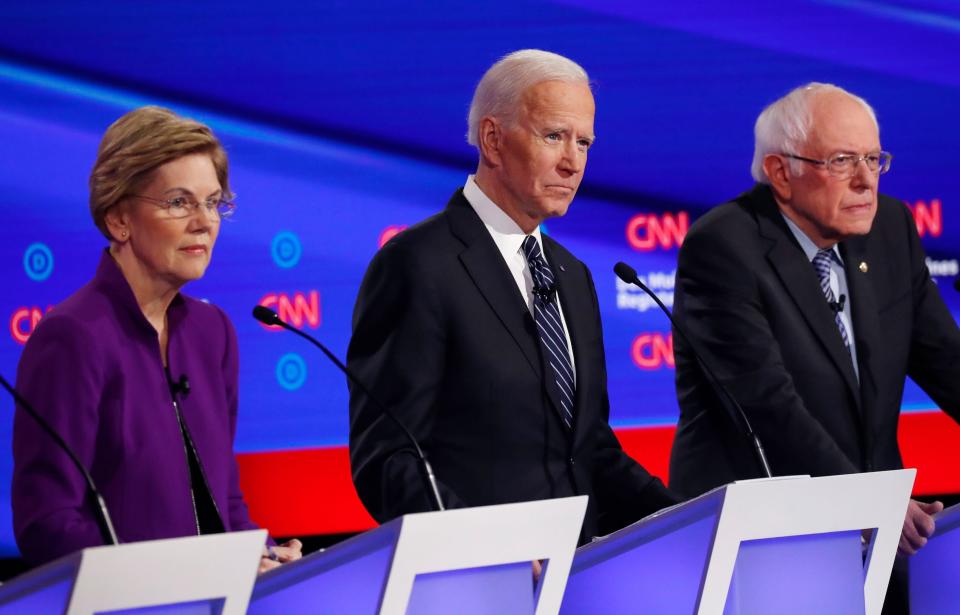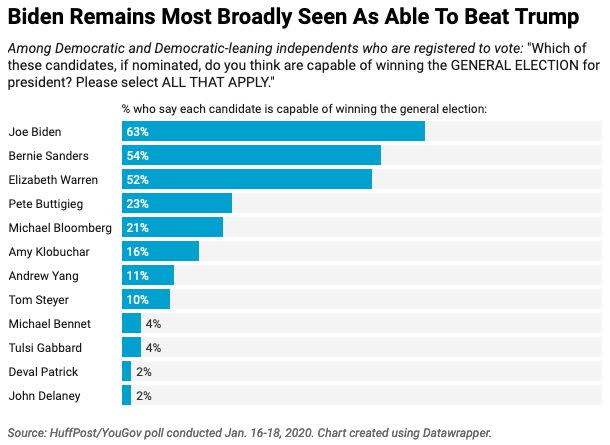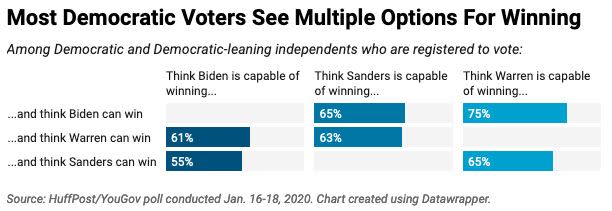What The Polls Show About How Electability Is Playing Out In 2020 Primary
Just days away from the first contest of the 2020 Democratic presidential primary, most of the leading candidates are making electability a cornerstone of their final pitches. And it’s easy to see why: For months, Democratic voters have made it evident in the polls that they’re particularly focused on taking down President Donald Trump.
Former Vice President Joe Biden is running ads in Iowa showing the results of head-to-head polls that pit him against Trump. Former South Bend, Indiana, Mayor Pete Buttigieg’s commercials include an Iowa state senator praising him as the one most capable of winning the general election. Massachusetts Sen. Elizabeth Warren, whose campaign previously emphasized her policy chops, is now running a spot with the title “Why She Will Beat Him.” Vermont Sen. Bernie Sanders has placed less emphasis on electability ahead of the Iowa caucuses, but it’s an issue his campaign has touted in the past.
Both voters and candidates have made it clear that electability matters. But the precise role that the subject plays in voters’ decision-making is less cut and dried, as new HuffPost/YouGov polling shows.

WHICH CANDIDATES DO VOTERS THINK ARE ELECTABLE?
In the abstract, Democratic and Democratic-leaning voters see candidates who are white, male and not too old as more electable, according to one new HuffPost/YouGov survey, although a sizable share of them say they don’t think demographic traits would affect voters’ choices. (All of that is roughly in line with polling taken last spring.)
In other words, voters feel better about people who largely look like the vast majority of past U.S. presidents.
Roughly 3 in 10 voters think that most of the electorate would be less likely to vote for a female candidate because of her gender, compared to just 2% who think a male candidate would face a similar disadvantage. Similarly, 30% think a nonwhite candidate would face more difficulty with voters, compared to 2% who say a white candidate would be disadvantaged. And 28% say they suspect the electorate would penalize a candidate over age 70.

Candidates, of course, are more than a collection of demographics, and voters’ opinions about the specific 2020 options don’t always line up with their general sense of what makes someone electable. Apparent concerns about an older candidate, for instance, haven’t stopped Biden, Sanders and Warren from rising to the top tier of the field ― although there has been significant talk about whether a woman can beat Trump ― or prevented Biden from regularly leading polls on perceived electability.
A 63% majority of Democratic and Democratic-leaning voters see Biden as capable of defeating Trump in the general election, a second new HuffPost/YouGov poll finds, with 54% saying the same of Sanders and 52% of Warren. Fewer than a quarter say the same of any other candidate, including Buttigieg.

There’s another important distinction to be made here: Although Democratic voters may have ideas about which candidate is most electable, few have their hopes pinned entirely on just one person. Instead, the vast majority think that multiple top-tier candidates would be able to defeat Trump.
To look at that question from a different angle, most of the voters who think Biden can win also say the same of Sanders and Warren. Most who think Sanders can win think that Biden and Warren can, too. And most who consider Warren electable think that her two biggest rivals are also electable.
Love HuffPost? Become a founding member of HuffPost Plus today.

HOW MANY PEOPLE WILL ACTUALLY VOTE BASED ON ELECTABILITY?
Sixty-five percent of Democratic and Democratic-leaning voters, the second poll finds, say they’re planning to simply vote for their favorite candidate. But a substantial minority, 23%, say they’re planning to choose someone who isn’t their favorite but has a better shot at winning. The rest are unsure or not planning to vote. Those findings are similar to polling from December when 24% said they planned to vote based on electability.
HOW DO VOTERS FEEL ABOUT THEIR OPTIONS?
Overall impressions of the field are positive: 43% of Democratic and Democratic-leaning voters say they’re enthusiastic about the state of the Democratic primary field, 38% are satisfied, 10% are dissatisfied, and just 1% are upset.
The voters are most likely to be excited about the prospect of nominating Warren (42% say they’d be enthusiastic if she were the nominee), Sanders (40%) and Biden (39%), followed by Buttigieg at 21%. Twenty-three percent would be upset if Biden were nominated, with 19% saying the same of Sanders and Buttigieg, and 14% saying it of Warren. The candidates generating the most unease are Rep. Tulsi Gabbard (D-Hawaii) and former New York City Mayor Michael Bloomberg.

Two-thirds of Democratic and Democratic-leaning voters now say they have at least “a good idea” of whom they’ll vote for, up from 55% in December ― although many are still less than firmly decided.
Use the widget below to further explore the results of the HuffPost/YouGov survey, using the menu at the top to select survey questions and the buttons at the bottom to filter the data by subgroups:

The first HuffPost/YouGov poll cited consisted of 1,000 completed interviews conducted Jan. 14-16 among U.S. adults, including 369 Democratic and Democratic-leaning voters. The second HuffPost/YouGov poll cited consisted of 1,000 completed interviews conducted Jan. 16-18 among U.S. adults, including 300 Democratic and Democratic-leaning voters. Both used a sample selected from YouGov’s opt-in online panel to match the demographics and other characteristics of the adult U.S. population.
HuffPost has teamed up with YouGov to conduct daily opinion polls. You can learn more about this project and take part in YouGov’s nationally representative opinion polling. More details on the polls’ methodology are available here.
Most surveys report a margin of error that represents some but not all potential survey errors. YouGov’s reports include a model-based margin of error, which rests on a specific set of statistical assumptions about the selected sample rather than the standard methodology for random probability sampling. If these assumptions are wrong, the model-based margin of error may also be inaccurate. Click here for a more detailed explanation of the model-based margin of error.
Also on HuffPost
This article originally appeared on HuffPost.

 Yahoo News
Yahoo News 